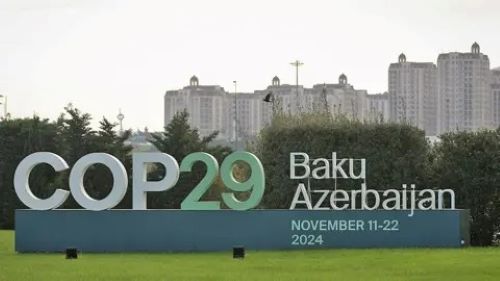Aftermath of Azerbaijan’s COP-29 Presidency: A Milestone in Global Climate Action

The historic COP-29 conference held under Azerbaijan’s presidency in Baku between 11 and 22 November 2024, stands as a landmark achievement in global climate diplomacy. Bringing together heads of states and representatives from nearly 200 nations, the event highlighted Azerbaijan’s growing role on the international stage, blending pragmatic leadership with ambitious goals for climate action. The summit’s outcomes not only set the tone for global environmental policies but also mirrored Azerbaijan’s own commitment to sustainable development and environmental stewardship.
Azerbaijan’s Diplomatic Victory at COP-29
COP-29 will be remembered for its ability to unify diverse nations around bold and necessary goals. Among its most transformative outcomes was the agreement by developed nations to channel “at least” $300 billion annually into developing countries by 2035. This unprecedented financial pledge aims to support the most vulnerable nations in their fight against climate change, enabling them to adapt to climate challenges, enhance renewable energy adoption, and build climate-resilient infrastructure.
Azerbaijani leadership also played a pivotal role in advancing mechanisms under Article 6 of the Paris Agreement, which governs carbon markets and cooperative approaches to emissions reduction. The negotiations led to a breakthrough agreement, establishing clear and transparent rules for international carbon trading. This achievement will encourage global investments in green projects, particularly in developing nations, and foster innovative solutions for carbon offsetting.
The framework ensures robust accounting measures to prevent double counting of emission reductions, a key sticking point in previous negotiations. It also introduced a mechanism for channeling a portion of proceeds from international carbon trades into adaptation projects for the most vulnerable communities. In fact, Article 6 is a cornerstone of global climate cooperation and its effective implementation can unlock billions in funding and drive transformative change for our planet.
Other significant outcomes of COP-29 included an accelerated global push for renewable energy, with nations committing to a 50% reduction in carbon emissions by 2035. The establishment of a “Green Energy Fund” and the introduction of mechanisms for biodiversity preservation further showcased Azerbaijan’s vision of a collaborative, equitable, and actionable approach to climate solutions.
Azerbaijan’s Domestic Environmental Policies and Green Energy Vision
Azerbaijan’s leadership at COP-29 was underpinned by its own substantial efforts to transition towards a greener future. The nation, traditionally reliant on its vast oil and gas reserves, has demonstrated a forward-thinking approach to integrating renewable energy into its economy. By 2030, Azerbaijan aims to generate 30% of its energy from renewable sources, with investments in solar, wind, and hydropower gaining momentum.
This vision has been driven by the decisive leadership of President Ilham Aliyev, who has consistently emphasized the importance of sustainable development for Azerbaijan’s future. Under his leadership, Azerbaijan has implemented a series of ambitious environmental policies, fostering international partnerships, and supporting transformative initiatives. President Aliyev’s strategic focus on green energy was evident in his address during COP-29, where he highlighted Azerbaijan’s commitment to environmental responsibility and its role in shaping global climate action. His efforts have positioned Azerbaijan as a leader in renewable energy and a model for sustainable development in the region.
One of the key highlights of this vision is Azerbaijan’s strategic partnership with Masdar, one of the world’s leading renewable energy companies based in the United Arab Emirates (UAE). This collaboration is spearheading transformative projects, such as the construction of the 230 MW Garadagh Solar Power Plant, which will significantly bolster Azerbaijan’s renewable energy capacity. The partnership also includes exploring offshore wind projects in the Caspian Sea, highlighting the potential for clean energy expansion in the region.
Masdar’s involvement reflects the strong bilateral relationship between the UAE and Azerbaijan and underscores the mutual commitment to fostering sustainable energy solutions. These projects, aligned with Azerbaijan’s green energy goals, position the country as a regional leader in renewable energy.
Rebuilding Karabakh: Sustainability at the Core of Development
Azerbaijan’s commitment to sustainability is perhaps most vividly exemplified in its reconstruction efforts in the liberated Karabakh region. Following nearly three decades of occupation, the government has embarked on a historic redevelopment program aimed at transforming Karabakh into a thriving and ecologically balanced region.
At the heart of this transformation are smart cities and villages, designed to prioritize renewable energy and modern infrastructure. Zangilan’s Smart Village project, already a symbol of Azerbaijan’s vision, incorporates solar energy systems, rainwater harvesting technologies, and energy-efficient housing. These developments are reshaping the region into a model for sustainable post-conflict reconstruction.
Furthermore, large-scale reforestation programs are reviving Karabakh’s natural landscape, which was severely degraded during the years of occupation. The government is also introducing modern agricultural practices, focusing on sustainable farming techniques that restore soil fertility and biodiversity while empowering local communities to rebuild their livelihoods.
Karabakh’s reconstruction reflects not just a commitment to the region’s prosperity but also a broader dedication to sustainable development principles. By blending environmental stewardship with economic growth, Azerbaijan is setting a global standard for post-conflict recovery.
Azerbaijan’s Growing Role on the Global Stage
The success of COP-29 has cemented Azerbaijan’s reputation as a leader in global climate governance. Under its presidency, the summit achieved meaningful and actionable outcomes, including the $300 billion financial commitment, significant progress on Article 6 of the Paris Agreement, and an extended push for renewable energy adoption. These accomplishments demonstrate Azerbaijan’s ability to bridge divides, unite stakeholders, and advance pragmatic solutions to the world’s most pressing challenges.
At the national level, Azerbaijan’s ambitious green energy policies, bolstered by strategic partnerships like that with Masdar, ACWA Power and other vital players in the relevant field, followed by the transformative redevelopment of Karabakh region align seamlessly with the goals of COP-29. By balancing its rich natural resources with a clear commitment to sustainability, Azerbaijan is not only advancing its domestic priorities but also inspiring other nations to adopt similar approaches.
As Azerbaijan looks to the future, its leadership at COP-29 will be remembered as a defining moment in its journey to becoming a global environmental leader. The country’s dual focus on climate action and sustainable development ensures that it will remain at the forefront of efforts to secure a greener, more equitable world for generations to come.
Last Updated on 3 months by News Desk 1











